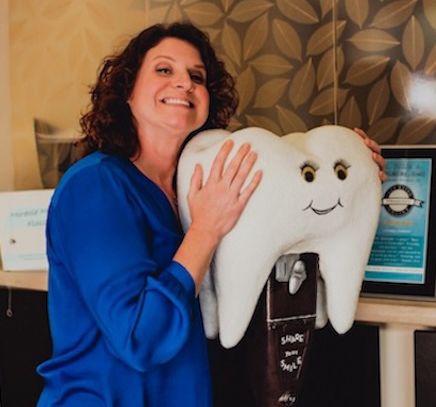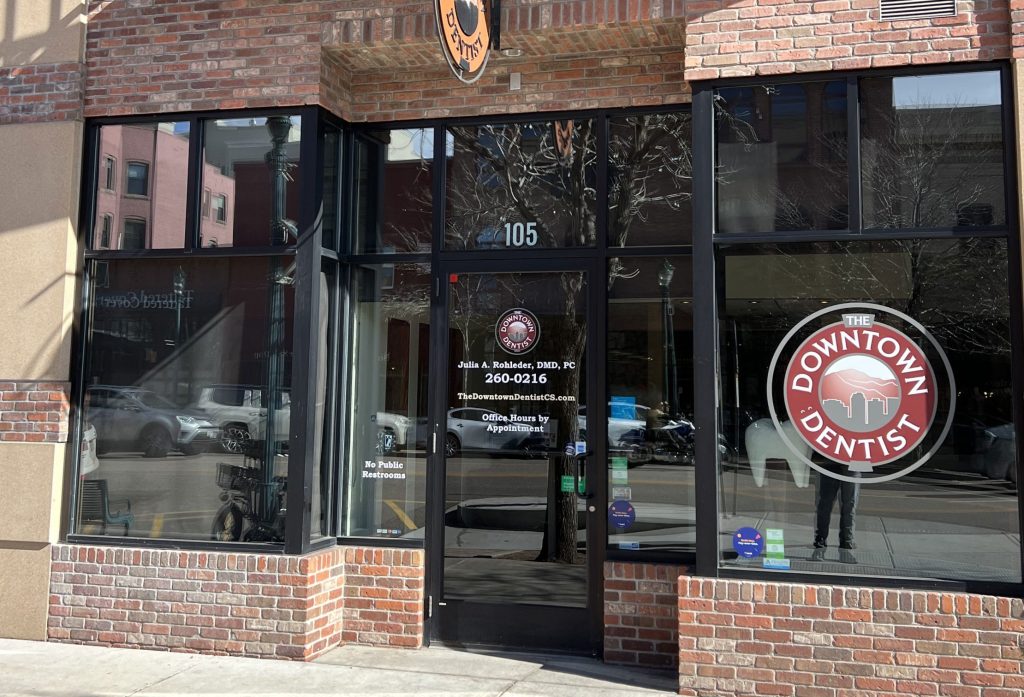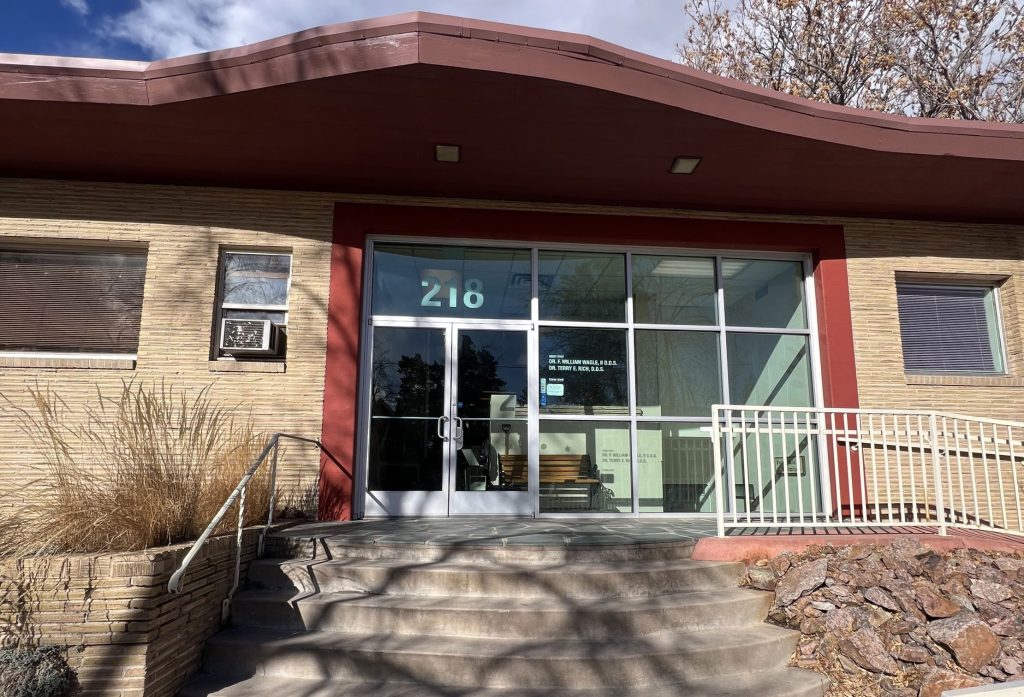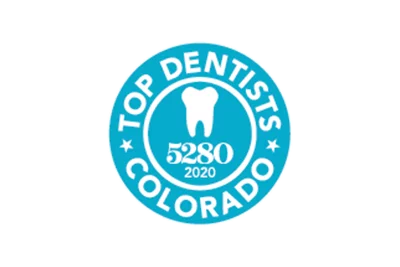Dental Injuries

Dental injuries can occur as a result of accidents, falls, sports-related incidents, or even traumatic events. These injuries can vary in severity, ranging from minor chips and cracks to more serious issues like fractures, dislodged teeth, and root damage. Dental trauma, depending on the type of injury, can affect both children and adults, potentially leading to pain, discomfort, swelling, and functional issues.
Let our team at The Downtown Dentist in downtown Colorado Springs help you maintain optimal oral health.
Understanding Dental Injuries
Dental injuries, also known as traumatic dental injuries, refer to any injury or damage to the teeth, gums, jawbone, or other soft tissues of the mouth. These injuries can range from minor issues like chips and cracks to more serious conditions such as fractures, dislodged teeth, and damage to the dental pulp. Early treatment is crucial in cases of traumatic dental injuries, as accidents such as falls, car wrecks, and sports-related injuries are the main cause. Understanding dental injuries and seeking prompt treatment can give you the best chance for full recovery.
Dental trauma can affect both primary (baby) teeth and permanent teeth, and it can occur as a result of accidents, falls, sports-related incidents, or other traumatic events.
Common Causes of Dental Injuries
Dental injuries can result from accidents, falls, and sports. Common causes include:
- Contact sports: Football, rugby, hockey, and basketball increase the risk due to collisions.
- Facial trauma: Car accidents or physical altercations can lead to dental injuries.
- Accidents and falls: Trips at home, school, or in public places can also cause dental trauma.
Knowing these causes helps individuals take preventive measures such as using mouthguards during risky activities.
Detailed Types of Dental Injuries
Dental injuries can vary in their impact on teeth and surrounding tissues. Recognizing the signs and symptoms of different types of dental injuries is crucial for seeking proper treatment. Injuries include fractured teeth, luxation, root resorption, and alveolar bone injuries. Understanding these types of injuries helps individuals seek the right dental care, including tooth extraction, at The Downtown Dentist.
Injuries to the Tooth Structure
Injuries to tooth structure from dental trauma can affect both external and internal components. Recognizing these injuries is crucial for timely treatment. One common injury is crown fracture, which ranges from minor chips to more extensive damage impacting the enamel and dentin layers, causing pain, sensitivity, and cosmetic issues. Enamel fractures affect the outer protective layer, while dentin fractures impact the layer beneath it, leading to increased sensitivity.
Proper diagnosis and treatment are essential to prevent further damage and maintain oral health. Treatments may include dental bonding, fillings, or crowns based on the injury’s severity.
Periodontal Tissues Damage
Dental injuries have the potential to cause harm to periodontal tissues such as gums and ligaments. When these tissues are damaged, it can result in issues like tooth mobility, pain, or inflammation. Seeking timely diagnosis and treatment is essential in order to prevent complications such as tooth loss or the development of gum disease.
In cases of dental injuries, it is imperative to consult with the professionals at The Downtown Dentist who can assess the extent of the damage and recommend appropriate treatment.
Depending on the severity of the injury, interventions may include procedures to stabilize the affected tooth, treatments to address inflammation or infection, or even surgical interventions in more severe cases. Furthermore, maintaining good oral hygiene practices and attending regular dental check-ups can help prevent dental injuries and catch any issues early on before they escalate into more serious problems.
By prioritizing oral health and seeking prompt treatment for any dental injuries, individuals can safeguard their teeth and gums from long-term consequences.
Injuries Affecting Dental Pulp
Dental injuries can have a significant impact on the dental pulp, which is a crucial soft tissue within the tooth housing blood vessels and nerves. When dental trauma occurs, it can often result in pulp necrosis, a condition that can lead to infection and discomfort in the affected tooth. In such cases, root canal therapy may be recommended as a treatment option to address these injuries and maintain the tooth’s functionality.
It is vital to promptly diagnose dental injuries and commence treatment early on to prevent potential complications from arising. Delaying treatment can exacerbate the issue, leading to further damage or infections. Seeking professional dental care at The Downtown Dentist following an injury is essential for ensuring proper management and preserving oral health in the long term. Regular dental check-ups can also aid in identifying any underlying concerns before they escalate into more serious problems.
Luxation Injuries of Teeth
Luxation injuries are a common occurrence resulting from trauma, leading to the displacement or loosening of a tooth. These injuries can manifest through symptoms such as pain, tooth mobility, and misalignment. Seeking immediate treatment is paramount to effectively reposition and stabilize the affected tooth, often involving the use of splints or wires for support.
Timely diagnosis and intervention play a pivotal role in ensuring optimal recovery and maintaining good oral health in the long run. It is crucial to note that luxation injuries can vary in severity, ranging from mild displacement to more serious cases of tooth dislocation. Therefore, prompt assessment is highly recommended to determine the appropriate course of action for each specific injury.
Additionally, post-treatment care and follow-up appointments are essential to monitor the healing progress and address any potential complications that may arise. In some instances, luxation injuries may also impact surrounding teeth and oral structures, underscoring the importance of comprehensive evaluation.
By prioritizing timely intervention and adherence to post-treatment guidelines, individuals can optimize their chances of successful recovery and minimize potential long-term consequences associated with luxation injuries.
Risk Factors and Prevention
Understanding dental injury risk factors is crucial for prevention. Factors include playing contact sports, such as football players, having an overjet, and prior dental injuries. Young individuals, especially children and adolescents, face higher risks due to active lifestyles and developing teeth. Using mouthguards during sports and helmets can significantly lower injury risks by cushioning impacts. Taking proactive measures helps maintain oral health.
Preventive Measures to Avoid Dental Injuries
Implementing preventive measures is crucial for maintaining optimal oral health and avoiding dental injuries. Some key measures include wearing mouthguards during sports and physical activities, maintaining good oral hygiene, using protective gear like helmets and face shields, and being cautious during physical activities. Incorporating these practices into daily routines can significantly reduce the risk of dental trauma.
First Aid for Dental Injuries
Knowing how to administer first aid for dental injuries is crucial. Immediate steps include rinsing the mouth, applying a cold compress, and using pain relievers. For knocked-out teeth, re-implantation or keeping the tooth moist is recommended. Broken pieces should be brought to the dentist if possible.
Immediate Steps to Take Post-Injury
After a dental injury, taking immediate steps can help minimize pain, reduce the risk of complications, and pave the way for successful treatment. These steps should be taken as soon as possible following an injury to the teeth or oral tissues.
The first immediate step is to rinse the mouth with water to cleanse the affected area and remove any debris or foreign particles. If the injury involves a lost or displaced baby tooth, do not try to put it back in. Instead, rinse your child’s mouth with salt water and use a cold compress if the mouth is swollen. Ask your pharmacist or doctor about pain relief medicines for children. Applying a cold compress to the outside of the mouth or cheek can help reduce swelling and alleviate pain.
It is important to avoid chewing or biting on the injured area to prevent further damage. Maintaining good oral hygiene by continuing to brush and floss the unaffected teeth is also crucial for overall oral health. However, individuals should exercise caution and avoid brushing or flossing directly over the injured area to prevent further irritation.
Seeking professional dental care at The Downtown Dentist as soon as possible is essential for a thorough evaluation, proper diagnosis, and appropriate treatment of the dental injury. Our team of professionals has the expertise to provide the necessary care to restore oral health and prevent further complications.
Handling Avulsed (Knocked-Out) Teeth
Avulsed or knocked-out teeth require immediate attention and prompt action to increase the chances of successful re-implantation. Handling the tooth correctly and seeking immediate dental care is crucial for saving the tooth and restoring oral function.
If a tooth is completely knocked out, it should be handled with care to prevent further damage. The tooth should be gently rinsed with water to remove any dirt or debris and immediately re-implanted back into the socket if possible. If re-implantation is not possible, the tooth should be kept moist by placing it in milk or saliva and taken to The Downtown Dentist as soon as possible. Time is of the essence in saving avulsed teeth, and seeking professional care within 30 to 40 minutes greatly increases the chances of successful re-implantation. In cases where there are accompanying significant soft-tissue cuts, also known as lacerations, oral antibiotics, and a tetanus toxoid injection may be prescribed to prevent infection.
It is important to note that avulsed teeth may cause discomfort or toothaches. Over-the-counter pain relievers can be taken to manage the pain until professional dental care can be obtained. By following these immediate steps and seeking prompt dental care, individuals can increase the chances of saving the avulsed tooth, especially if it is an adult tooth, and restoring oral function.
Managing Fractured or Chipped Teeth
Fractured or chipped teeth require immediate attention and appropriate management to prevent further damage and minimize the risk of complications. By following the necessary steps and seeking professional dental care, individuals can restore the structure and function of the affected tooth.
Immediate management of fractured or chipped teeth involves locating any broken pieces and gently rinsing the mouth with water to clean the area. Applying a cold compress to the outside of the mouth or cheek can help reduce swelling and alleviate pain.
Seeking professional dental care at The Downtown Dentist as soon as possible is crucial for definitive treatment. Our professionals may recommend treatments such as dental bonding, dental fillings, or dental crowns to restore the structure and protect the tooth from further damage. In cases of tooth displacement, a splint may be used to stabilize the tooth and promote healing.
It is important to note that fractured or chipped teeth are considered dental emergencies, and prompt dental care is necessary for the best prognosis and long-term oral health. By seeking professional treatment at The Downtown Dentist, individuals can preserve the tooth and prevent further complications.
Schedule a consultation, today
Understanding dental injuries is crucial for maintaining optimal oral health. By identifying the types, causes, and preventive measures, you can protect your teeth from potential harm. Prompt actions post-injury and knowing when to implement first aid, are essential for favorable outcomes. Remember, prevention is key, so being aware of high-risk activities and using protective gear, especially for baby teeth, can significantly reduce the likelihood of dental injuries. Schedule a consultation, today, to learn more about how to protect your child’s teeth. Let our team at The Downtown Dentist in downtown Colorado Springs help you to ensure a healthy and vibrant smile for years to come. Schedule an appointment by calling (719) 260-0216 for our Tejon Street location or (719) 633-3711 for our Willamette Avenue location.

 Dr. Rohleder
Dr. Rohleder Meet the Team
Meet the Team Sterilization Protocol
Sterilization Protocol Frequently Asked Questions
Frequently Asked Questions Careers
Careers












